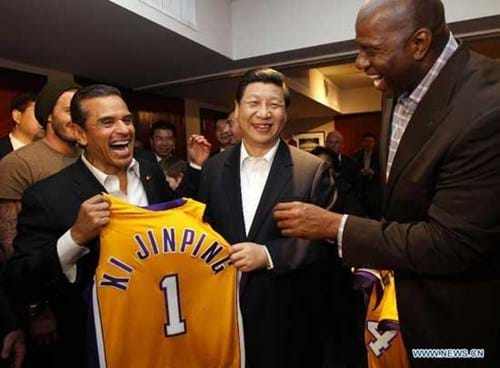
Far from China’s First Rodeo
Last month, China’s President Xi Jinping joined other world economic and political leaders in Davos for the World Economic Forum. In a display never seen from a leader of the world’s second-largest economy, President Xi took to the podium to defend globalization, free trade and economic transparency, while promoting issues relating to climate change and social progress.
Following the address, Mark Pinner at Interel penned a smart piece on the public policy implications of the visit. After reading his post, it got me thinking about some of the ways China has historically engaged on international platforms and just how significant his voice at Davos really is.

From Vice Premier Deng Xiaoping’s visit to the US in 1979 (where he donned a cowboy hat), to President Xi Jinping’s recent US visit (where he attended an LA Lakers game and was given a jersey with his name and the number one on it), Chinese Leaders have used state visits to help shape the external image of China. These moves clearly aim to sell a softer side of their personalities, helping create a more accessible and approachable persona. The goal of course is to build bridges.
Important as these gestures are, in the end, they tend to be part of a singular mission. Putting Mr. Xi on the stage in front of the world elite three days before the Trump inauguration was not just a speech, nor him putting on a hat – it was a deliberate branding exercise that looked to underline China’s new role as a leader of the global free-market.
Although Mr. Trump and his proposed protectionist policies weren’t mentioned directly, Mr. Xi did take the opportunity to communicate a subtle message: “Pursuing protectionism is just like locking one’s self in a dark room. Wind and rain may be kept outside, but so will light and air.”
Ok, so it wasn’t subtle at all, but this is where the power of communications is so important. Mr. Xi used this opportunity to attempt to reverse the rhetoric that normally surrounds China on the global stage. “Public diplomacy”, is how Forbes put it, noting the crucial importance of the setting of the forum in creating the impression that China is keen to support globalization.
Now that this very public statement has been made, can we expect this to be the beginning of a new chapter in how China communicates with the world? Knowing China likes predictability and plays the long game, if Mr. Xi’s words ring true, we can expect this to be the start of China building its epic, not simply an episode.
To be successful, China will need to drive home messages of partnership, collaboration, demonstrate intent to work alongside other countries, and a willingness to lead by example. This is a time of showing, not just telling, and China will need to follow through on a commitment to helping the advancement of global affairs, even when it means putting its own direct economic or political interests behind.
When China sets its mind to something, it tends to deliver. But will it be willing and able to prove that its attempts at engagement with the rest of the world are genuine and authentic during these turbulent times? Don’t forget, this isn’t China’s first Rodeo.
The latest blogs from WE
Decoding Gen Alpha: A Primer on the Next Gen of Consumers
Why Gen Alpha Will Fuel Spending This Season
Why Reputation Is a Business Driver in Healthcare

